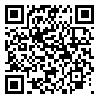BibTeX | RIS | EndNote | Medlars | ProCite | Reference Manager | RefWorks
Send citation to:
URL: http://jdm.tums.ac.ir/article-1-5014-en.html
Background and Aims: Successful pediatric dentistry depends not only on the dentist's technical skills, but also on his ability to acquire and maintain a child's cooperation. The correction of dentist’ action in this area affects the view of parents and increases the quality of dental services. The objective of this study was to evaluate the attitudes of general dentists toward methods of controlling pediatrics’ behavior in Isfahan.
Materials and Methods: This study is descriptive, analytic, and cross-sectional. For this research, 100 general dentists of Isfahan city were selected with simple random sampling technique and were asked to complete the questionnaire which was included four different management techniques. The data were analyzed with t-test, P earson’s correlation , ANOVA and Kruskal-Wallis.
Results: The methods accepted by dentists were Tell-Show-Do (4.0 ± 0.5), Voice control (3.5 ± 0.4), active restraint (3.0 ± 0.5) and Hand-Over-Mouth (2.9 ± 0.5) respectively. The mean score of female dentists’ attitudes was more toward the method of active restraint and less toward Hand-Over-Mouth technique. Also the average score of middle aged dentists’ attitudes toward Voice Control method was less than young dentists and toward Hand-Over-Mouth was higher. The general dentists with more number of pediatric patients had less consent on the method of Hand-Over-Mouth (P=0.004) and active restraint (P=0.034).
Conclusion: There were significant correlation between attitude of general dentists toward behavior management techniques with age, gender, clinical experience and the number of pediatric patients. General dentists have fewer tendencies to aggressive behavior management techniques.
Received: 2012/11/21 | Accepted: 2013/04/30 | Published: 2013/09/14
| Rights and Permissions | |
 |
This work is licensed under a Creative Commons Attribution-NonCommercial 4.0 International License. |




